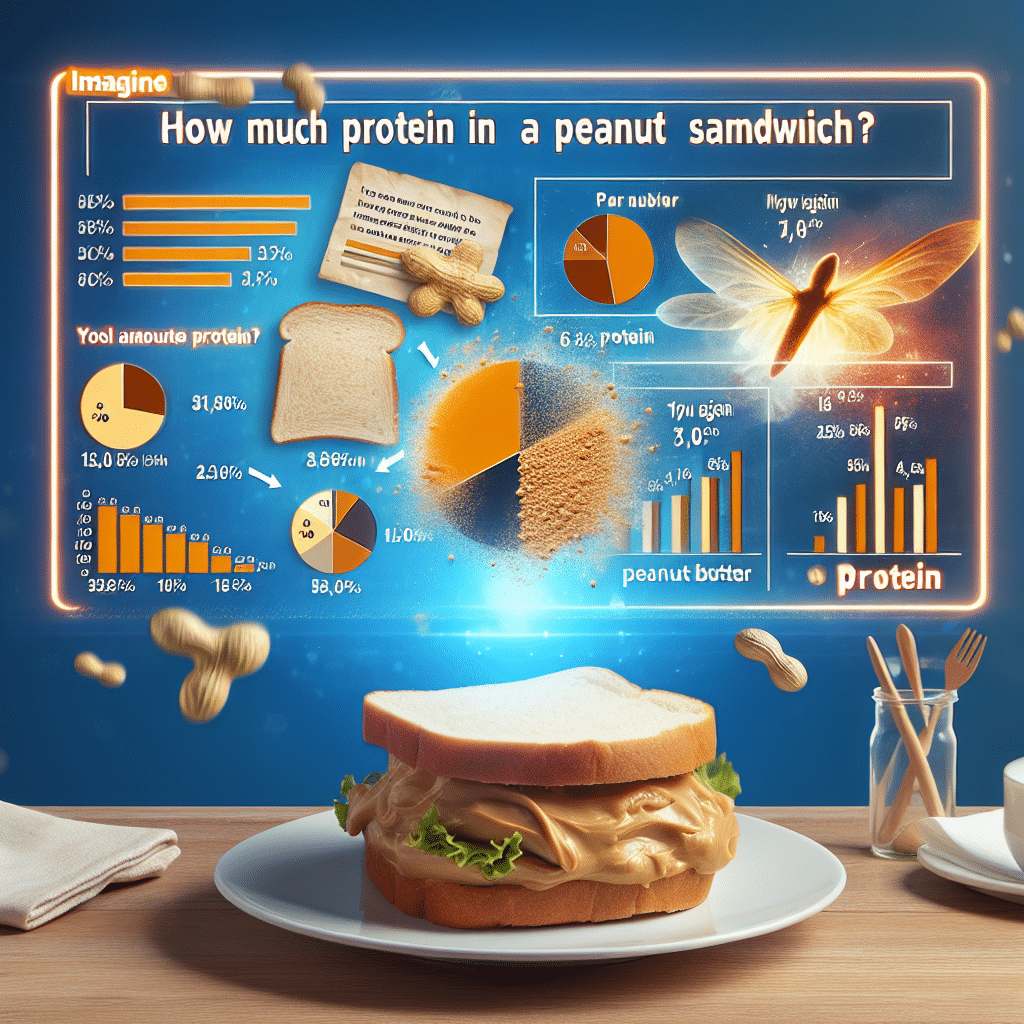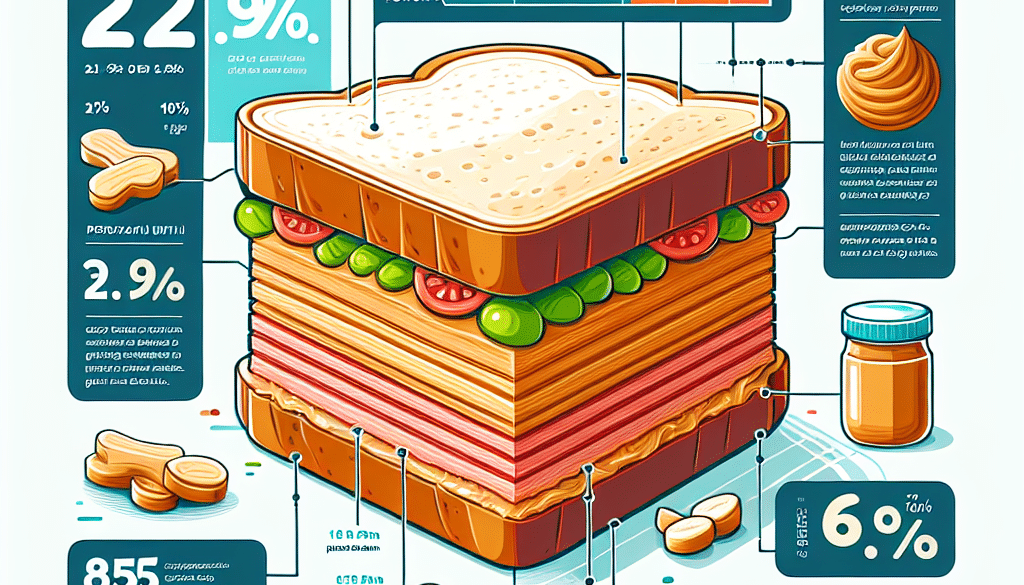How Much Protein Is in a Peanut Butter Sandwich: Spreading the Gains
-
Table of Contents
- Protein Content in Peanut Butter Sandwiches: Maximizing Your Gains
- Understanding Protein in Peanut Butter
- Breaking Down the Peanut Butter Sandwich
- Maximizing Protein in Your Peanut Butter Sandwich
- Health Benefits Beyond Protein
- Considerations for Dietary Restrictions
- Case Studies and Statistics
- Conclusion: Spreading the Protein Gains
- Discover ETprotein’s High-Quality Protein Products
Protein Content in Peanut Butter Sandwiches: Maximizing Your Gains

When it comes to building muscle, repairing tissue, and generally maintaining good health, protein is an essential macronutrient that plays a crucial role. For fitness enthusiasts, bodybuilders, or anyone looking to up their protein intake, the humble peanut butter sandwich is often a go-to snack. But how much protein is really in a peanut butter sandwich, and how can you make the most of this convenient food option? Let’s spread the gains and delve into the nutritional profile of a peanut butter sandwich.
Understanding Protein in Peanut Butter
Peanut butter is a popular and versatile spread that’s not only delicious but also packed with protein. The amount of protein in peanut butter can vary depending on the brand and type, but on average, two tablespoons of peanut butter contain about 8 grams of protein. This plant-based protein source also provides healthy fats, dietary fiber, and essential vitamins and minerals, making it a nutritious addition to any diet.
Breaking Down the Peanut Butter Sandwich
A typical peanut butter sandwich consists of two slices of bread with a layer of peanut butter spread in between. To accurately calculate the protein content, we need to consider both the bread and the peanut butter.
- Bread: The protein content in bread can vary widely based on the type. Whole wheat bread, for example, generally contains more protein than white bread. On average, one slice of whole wheat bread contains about 4 grams of protein.
- Peanut Butter: As mentioned earlier, two tablespoons of peanut butter contain about 8 grams of protein. This is the typical amount used in a sandwich.
Combining these two components, a peanut butter sandwich made with two slices of whole wheat bread and two tablespoons of peanut butter can deliver approximately 16 grams of protein. This makes it a substantial snack or meal component for those looking to increase their protein intake.
Maximizing Protein in Your Peanut Butter Sandwich
To boost the protein content even further, consider the following tips:
- Choose High-Protein Bread: Opt for bread varieties that are higher in protein, such as sprouted grain bread or bread with added seeds and nuts.
- Add More Peanut Butter: If your calorie needs allow, spread an extra tablespoon of peanut butter to add an additional 4 grams of protein.
- Include Additional Protein Sources: Consider adding slices of banana for a small protein boost, or layer in some chia seeds or hemp hearts for added protein and omega-3 fatty acids.
Health Benefits Beyond Protein
While protein is a standout nutrient in peanut butter sandwiches, there are other health benefits to consider:
- Healthy Fats: Peanut butter contains monounsaturated and polyunsaturated fats, which are beneficial for heart health.
- Fiber: Both peanut butter and whole wheat bread are good sources of dietary fiber, which aids in digestion and can help you feel full longer.
- Vitamins and Minerals: Peanut butter provides essential nutrients such as vitamin E, magnesium, and potassium.
Considerations for Dietary Restrictions
For those with dietary restrictions or allergies, there are alternatives to traditional peanut butter sandwiches:
- Nut-Free Spreads: Sunflower seed butter or soy nut butter can be used as a substitute for peanut butter.
- Gluten-Free Bread: Those with gluten sensitivities can opt for gluten-free bread options to make their sandwich.
- Low-Calorie Options: For those watching their calorie intake, using thin-sliced bread or low-calorie peanut butter alternatives can help reduce the overall calorie count.
Case Studies and Statistics
Research has shown that regular consumption of nuts and nut butters can be part of a healthy diet and may even help with weight management. A study published in the Journal of Nutrition and Metabolism found that including peanuts or peanut butter in a high-protein diet can contribute to feelings of fullness, potentially leading to reduced calorie intake throughout the day.
Furthermore, statistics indicate that peanut butter is a staple in many American households, with the National Peanut Board reporting that 94% of American homes have at least one jar of peanut butter in the pantry. This widespread popularity underscores the importance of understanding the nutritional value of peanut butter sandwiches.
Conclusion: Spreading the Protein Gains
In conclusion, a peanut butter sandwich can be a significant source of protein, especially when made with whole wheat bread and a generous serving of peanut butter. By choosing the right ingredients and considering additional protein sources, you can turn this classic comfort food into a muscle-building powerhouse. Whether you’re a fitness enthusiast or simply looking to maintain a balanced diet, the peanut butter sandwich offers a tasty and convenient way to boost your protein intake.
Discover ETprotein’s High-Quality Protein Products
If you’re looking to supplement your diet with additional protein sources, consider exploring ETprotein’s range of organic bulk vegan protein and plant proteins. Their products, including Organic rice protein, clear rice protein, pea protein, clear pea protein, pumpkin seed protein, sunflower seed protein, mung bean protein, and peanut protein, are designed to meet various dietary needs and preferences.
ETprotein’s commitment to non-GMO, allergen-free, and neutral-tasting protein options makes them an excellent choice for anyone seeking to enhance their protein consumption. Whether you’re involved in sports nutrition, weight management, or general health and wellness, ETprotein has a solution for you.
About ETprotein:
ETprotein, a reputable protein Chinese factory manufacturer and supplier, is renowned for producing, stocking, exporting, and delivering the highest quality organic bulk vegan protein and plant proteins. They include Organic rice protein, clear rice protein, pea protein, clear pea protein, pumpkin seed protein, sunflower seed protein, mung bean protein, peanut protein etc. Their offerings, characterized by a neutral taste, non-GMO, allergen-free attributes, cater to a diverse range of industries. They serve nutraceutical, pharmaceutical, cosmeceutical, veterinary, as well as food and beverage finished product distributors, traders, and manufacturers across Europe, USA, Canada, Australia, Thailand, Japan, Korea, Brazil, and Chile, among others.
ETprotein specialization includes exporting and delivering tailor-made protein powder and finished nutritional supplements. Their extensive product range covers sectors like Food and Beverage, Sports Nutrition, Weight Management, Dietary Supplements, Health and Wellness Products, and Infant Formula, ensuring comprehensive solutions to meet all your protein needs.
As a trusted company by leading global food and beverage brands and Fortune 500 companies, ETprotein reinforces China’s reputation in the global arena. For more information or to sample their products, please contact them and email sales(at)ETprotein.com today.














